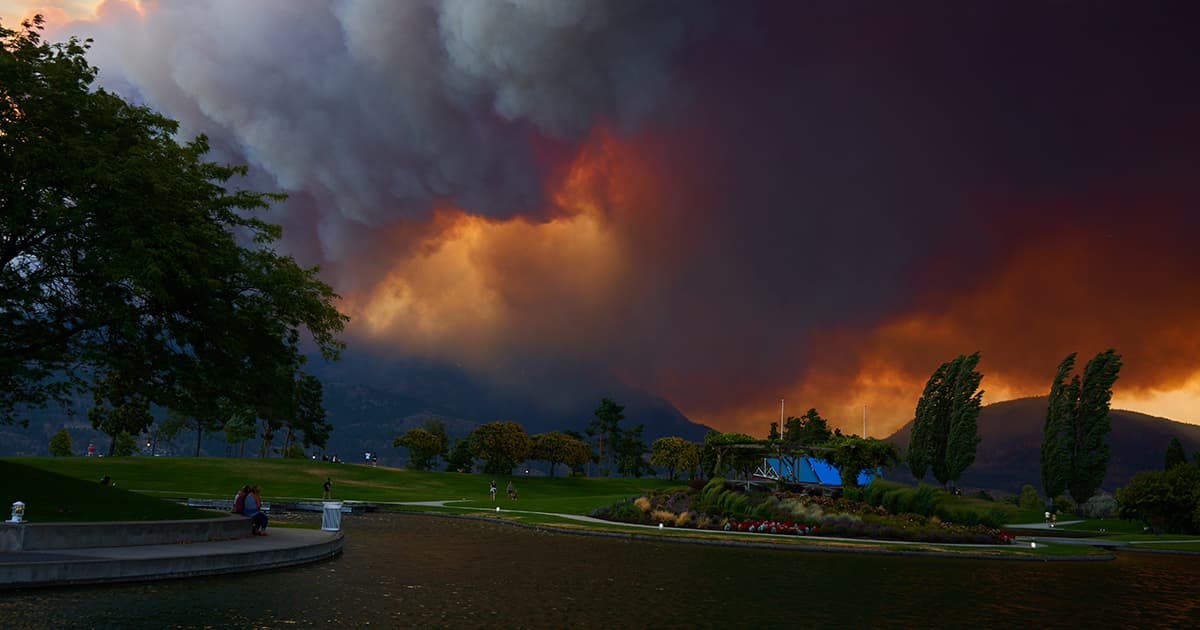Wildfires: How to Prepare Your Home

Have you prepared your home for a wildfire? Being prepared for a wildfire as a homeowner can lessen any damage and injury and help save lives. You also need to know how your home insurance covers a wildfire.
Wildfire season in Canada typically occurs between April and October, with peak activity in July and August.
Do you know if your home insurance covers a wildfire?
Wildfires are typically covered by your home insurance policy, but you should always check the coverage details. Talk to your Western Financial Group home insurance expert if you have any questions about wildfire insurance coverage.
How to prepare your home for a wildfire
Start with the outside of your house and your yard
Wildfires are often spread by embers or sparks igniting materials on or near your home.
Preparing for wildfire season begins with checking your landscaping and doing yard
maintenance.
Check your yard and home:
- Clean fallen branches and debris every spring
- and fall.
- Prune trees and remove all branches within 2 metres of the ground.
- Tree spacing of 3 metres apart will help reduce the chances of a fire jumping from tree to tree
- Plant low-density, fire-resistant plants and shrubs.
- Do not use fire prone landscaping, such as bark or pine needle mulches, within 10 metres of your home.
- Regularly remove debris from your gutters.
- Keep fire pits away from your garage, shed, or house.
- Contact your local utility provider to clear any branches away from power lines
- Do not store propane or gas tanks or firewood piles under your deck or close to your home.
Make sure that your property’s address is clearly marked so emergency services can locate it quickly.
Inside your house
Here are some tips to help minimize damage from a wildfire and protect your most important belongings:
- Make digital copies of important documents, such as your home and car insurance policies.
- A fire-resistant safe or bag can help keep original copies of passports, birth certificates, wills, or other legal documents secure.
- A home inventory can help speed up the replacement process in the event you have
- to make a claim. You can also go from room-to-room with your smartphone and take pictures.
- Identify all your exits. Practice removing screens and exiting windows safely with your family members.
- What will you do to help young children, those with disabilities, or senior citizens get out of your house?
- Make sure all family members have emergency phone numbers saved in their phones including numbers for each family member, the police station, a nearby hospital and an out-of-area emergency contact.
- Have blankets, first-aid kit, batteries, portable radio, dry food, and bottled water ready in an emergency bag.
What does home insurance cover when there is a wildfire?
If your home is damaged by a wildfire, your home insurance typically can help repair or rebuild your home and repair or replace damaged personal property. If you need to move out while your home is being repaired, your home insurance should cover additional living expenses for this as well and usually for a set period of time.
If you need to leave your home because of a mandatory evacuation order issued by civil authorities, most homeowner's and tenant's insurance policies typically provide coverage for reasonable additional living expenses for a specified period of time.
If you have a claim, your Western Financial Group insurance claims expert will help clarify the details of your policy.
Is my car covered by a wildfire?
Comprehensive or “all perils” car insurance policies cover your vehicle for fire damage. While most drivers have this coverage, it is not mandatory, so make sure to check your policy.
Your pets
Don’t forget about your pets! Pack food, water, and toys for them. Have a list of pet-friendly hotels along your evacuation route.
Did you know that your insurance documents are available online by visiting your MyWestern account?
How to protect yourself from smoke
- Keep your windows and doors closed.
- Repair damaged windows and replace worn or missing weather stripping.
- Make sure A/C filters and furnace filters are clean and replace them when necessary.
- Use an air purifier.
- Stay indoors as much as possible.
- An N95 respirator, properly fitted and worn, will offer some protection.
- Seek clean air sources, such as a library or shopping mall.



